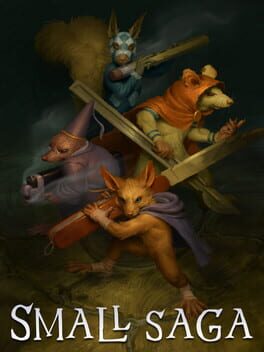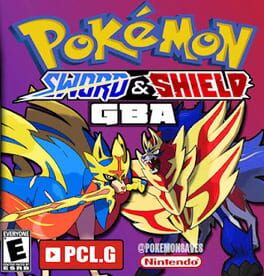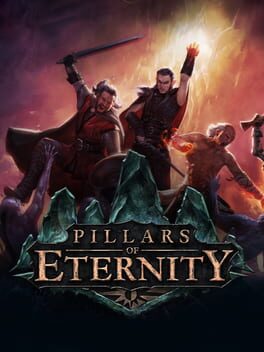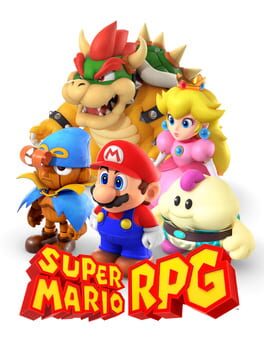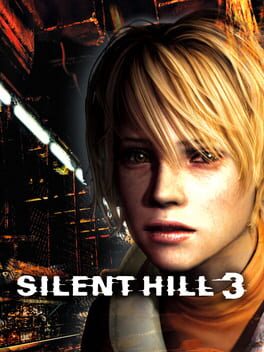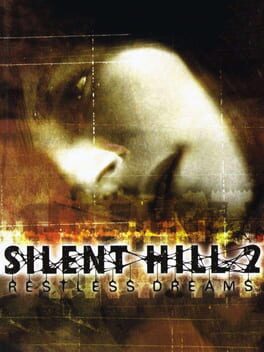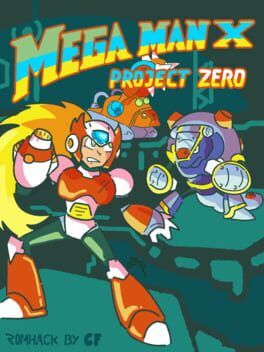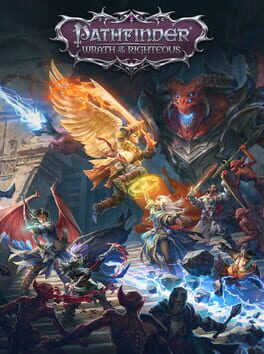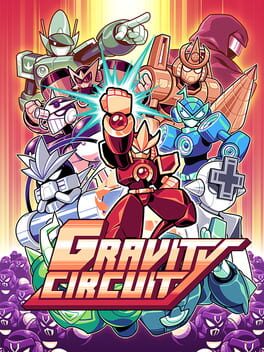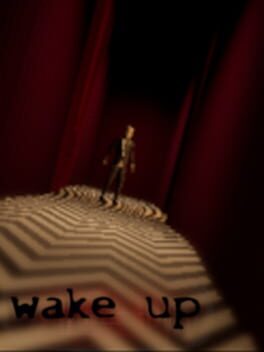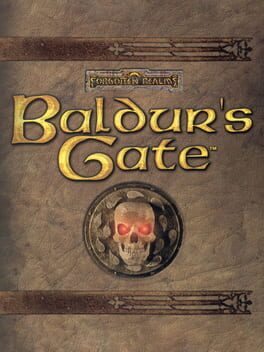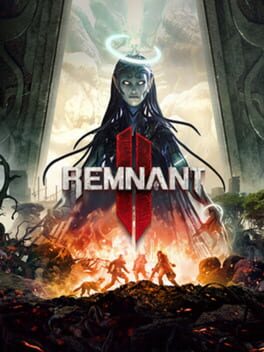2023
2024
2015
What a fucking game, my dudes and duderinas. I played Pillars of Eternity when it came out way back in 2015 and while I loved it then, I think I still didn't quite get it. The game throws a ton of lore and setting exposition right at the very beginning and it never lets up, which made it difficult, for me anyway, to connect with the setting. However, deeper into the game things do start to fall in place, and as a setting, Eora is incredibly rich not only in history, cultural diversity, and storytelling, but in its ideas and prose as well. Every character the player will meet in Pillars of Eternity comes with his or her own set of flaws, ambitions, and perspective of the world around them that are grounded in the same storytelling and universe that the player experiences, and while they do have realism woven into their personalities, the character writing is more literary mythic than anything else. Eora and its denizens are heavily steeped in historical context within the game-world as well as within the philosophical context of their real world inspirations. Memory, history, and reconciliation of past and present are ever-present throughout the game's narrative and companions.
While the dense writing and lore may cause a barrier to entry on the writing side, Pillars of Eternity's combat and RPG systems are wonderfully CRPG beginner friendly. Every attribute is meaningful and can contribute to any build which makes it difficult to brick a character, allowing for roleplay to take precedence across builds. Obviously, as with any CRPG, min-maxing optimization can occur if a player desires to powergame, but the system does not punish more casual players, resulting in a positive experience for both ends of the spectrum. I played a rogue who wore heavy plate armor and used a gun, but the standard light-armored sneaky rogue would work just as well, for example.
However, the real highlights of Pillars of Eternity happen when the game turns all of this worldbuilding on its head and finally considers the implications of the ideas it sets forth. Themes of post-colonialism, ontology, historical relevance, nihilism, and imperial exceptionalism all are not only represented within the game, but are confronted directly by the player. It's not enough just to represent these ideas within the game world - the player is specifically tasked to think about philosophical questions in order to progress through conversations and form plans on how to move forward.
Few games seem to do this as openly and bluntly as Pillars of Eternity does, and while the game may have originally existed as a kickstarter project meant to placate fans, like myself, of Baldur's Gate, narratively Pillars of Eternity is much more in line with something like Planescape: Torment or Bethesda's post-modernist take on fantasy lore via Morrowind. Like all celebrated and dissected mythologies, Eora isn't afraid to get both historical and weird in order to confront our idea of humanity and the world we live in.
While the dense writing and lore may cause a barrier to entry on the writing side, Pillars of Eternity's combat and RPG systems are wonderfully CRPG beginner friendly. Every attribute is meaningful and can contribute to any build which makes it difficult to brick a character, allowing for roleplay to take precedence across builds. Obviously, as with any CRPG, min-maxing optimization can occur if a player desires to powergame, but the system does not punish more casual players, resulting in a positive experience for both ends of the spectrum. I played a rogue who wore heavy plate armor and used a gun, but the standard light-armored sneaky rogue would work just as well, for example.
However, the real highlights of Pillars of Eternity happen when the game turns all of this worldbuilding on its head and finally considers the implications of the ideas it sets forth. Themes of post-colonialism, ontology, historical relevance, nihilism, and imperial exceptionalism all are not only represented within the game, but are confronted directly by the player. It's not enough just to represent these ideas within the game world - the player is specifically tasked to think about philosophical questions in order to progress through conversations and form plans on how to move forward.
Few games seem to do this as openly and bluntly as Pillars of Eternity does, and while the game may have originally existed as a kickstarter project meant to placate fans, like myself, of Baldur's Gate, narratively Pillars of Eternity is much more in line with something like Planescape: Torment or Bethesda's post-modernist take on fantasy lore via Morrowind. Like all celebrated and dissected mythologies, Eora isn't afraid to get both historical and weird in order to confront our idea of humanity and the world we live in.
2023
Having not played the original when I was a kid, I did everything possible to get as close to the child-like experience:
Step 1 - Remove all four of your wisdom teeth
Step 2 - Take painkillers before reverting to baby-state and sleep for 24 hours
Step 3 - After baby-state hibernation is complete, awaken as a young disgruntled adolescent who lays on the couch for days on end while playing Mario RPG and eating copious amounts of jello and pudding
Step 4 - Add in watching some Sopranos and some more painkillers and realize the connections between the New Jersey mob and the Super Mario RPG gang - Mario is obviously Tony leading the gang but still has some issues, Mallow is Christopher who comes along early and immediately you're like ah this fucking guy c'mon bro but then he comes in clutch a few times, Geno is Silvio the right hand man, Bowser is the combo of Paulie and Big Pussy with the fat guy enforcer aesthetic, and Peach is the smokin' hot therapist as evidenced by her first special move being called 'Therapy.' The Smithy gang are a combo of Tony's own family and his fears of losing his kingdom - put a pair of glasses on Exor's sword or Smithy and tell me that's not Uncle Junior in the flesh.
Step 5 - Write this dumbass review and boot up Paper Mario
Step 1 - Remove all four of your wisdom teeth
Step 2 - Take painkillers before reverting to baby-state and sleep for 24 hours
Step 3 - After baby-state hibernation is complete, awaken as a young disgruntled adolescent who lays on the couch for days on end while playing Mario RPG and eating copious amounts of jello and pudding
Step 4 - Add in watching some Sopranos and some more painkillers and realize the connections between the New Jersey mob and the Super Mario RPG gang - Mario is obviously Tony leading the gang but still has some issues, Mallow is Christopher who comes along early and immediately you're like ah this fucking guy c'mon bro but then he comes in clutch a few times, Geno is Silvio the right hand man, Bowser is the combo of Paulie and Big Pussy with the fat guy enforcer aesthetic, and Peach is the smokin' hot therapist as evidenced by her first special move being called 'Therapy.' The Smithy gang are a combo of Tony's own family and his fears of losing his kingdom - put a pair of glasses on Exor's sword or Smithy and tell me that's not Uncle Junior in the flesh.
Step 5 - Write this dumbass review and boot up Paper Mario
2003
This day has finally come.
That's right -- the day when you and I will meet.
I was always thinking of you,
here with this DS4 controller in my hand.
I never even knew your name
or face until today.
But now I know.
Oh how I love you, Heather.
It's okay that you run funny
with your feet out to the side.
Or that you got killed by a mirror.
Hey, it happens.
You are still a great protagonist.
Your skill rivaling Sekiro,
with a blade as sharp as your snark.
I guess a hair dryer works too, in a pinch.
I knew you'd defeat your competition.
She doesn't even have eyebrows.
Wait, did she really just eat that???
Either way, great job at being cool.
Thanks for letting me play your game.
After all, you and I exist as one.
What I give to you is the same as
what I give to me.
- Stanley Coleman
That's right -- the day when you and I will meet.
I was always thinking of you,
here with this DS4 controller in my hand.
I never even knew your name
or face until today.
But now I know.
Oh how I love you, Heather.
It's okay that you run funny
with your feet out to the side.
Or that you got killed by a mirror.
Hey, it happens.
You are still a great protagonist.
Your skill rivaling Sekiro,
with a blade as sharp as your snark.
I guess a hair dryer works too, in a pinch.
I knew you'd defeat your competition.
She doesn't even have eyebrows.
Wait, did she really just eat that???
Either way, great job at being cool.
Thanks for letting me play your game.
After all, you and I exist as one.
What I give to you is the same as
what I give to me.
- Stanley Coleman
This review contains spoilers
I'm really into cults. Probably a bad tagline for a dating profile or resume header, but the intrigue works well for delving into the twisted town of Silent Hill. It is truly fascinating how so many cults are able to rewire the human psyche into believing practical insanity in order to have them work against their own best interests, including the most basic fundamental human desire: survival. The survival of self is cast off in favor of the promise of ascension in service to something greater and a more complete understanding of the universe's framework. It's human nature to look for patterns, and cults claim to offer the key to the celestial cipher of existence. Unfortunately, this key only opens a path to self-destruction - the endless letters of code mistranslated and re-arranged to be subservient to only one person, the cult leader.
Enter Silent Hill with its cult of nightmares born from the torture of a young girl and her never-ending wounds. It's a classic horror-cult story with the cult members grasping at achieving something they don't quite understand, something cosmically unknown, at the cost of their own self-survival - nightmare monsters from other worlds aren't usually known for bringing about positive change, even for those that summon it.
I went into Silent Hill 2 not really knowing anything about it other than pop-culture stuff like Pyramid Head existing. The cover has a girl on it who also happens to be the first person we meet. Here we go again - I'm ready for the plot to take me to the inevitable conclusion that the cult is back at it again, torturing Angela in horrific ways in order to birth a new nightmare. Of course, we're supposed to be looking for Mary, our dead wife, but you don't understand - I am really smart and can see past this red herring main plot. I can't be tricked.
Hours go by, and while there have been some other things thrown in here to take me off the scent (namely Laura), my suspicions about this being Angela's nightmare grow even stronger as I find Pyramid Head sexually assaulting creatures that have no face or identity, but only legs and groin. When I see Angela again, she's about to commit suicide, and then I see she has torn her father out of a family portrait. Yeah, I knew exactly where all this was going. I am smart.
Despite meeting Maria, talking more with Laura, and getting other hints throughout the game, I wasn't ready to concede that this wasn't Angela's nightmare until I found the Blood-Soaked newspaper about her killing her father, followed by killing his nightmare form afterwards. It was a moment of revelation where things started to click and the wheels started to turn in my brain that maybe this was less about Angela and more about James. It was a brilliant subversion of the first game's mythology, and cemented Silent Hill 2 as one of the greatest successes as a sequel in my mind. I was deliberately played by my own expectations from the first game, and much like James dropping down further and further into Silent Hill's abyss, my thoughts went down a rabbit hole trying to recontextualize everything that I had seen before.
After finishing the game and learning the truth of everything, I understood that Silent Hill 2 is still a narrative about a cult - the cult of self. James disregards his own self-preservation and gives himself over in service to the search for indecipherable knowledge - understanding of his own subconscious processing of grief and guilt. He's both the leader and follower in this cult of one, sacrificing pieces of himself in order to ascend past his shattered self and either achieve peace by being able to leave Mary behind, or by making the ultimate sacrifice to find justice for her murder.
Everything in Silent Hill 2's presentation is built to reinforce this introspective deconstruction that James goes through, from denial to understanding, but the best example I can give is the original soundtrack. The most emotionally charged moments aren't met with a bombastic horror-driven score, but rather music that lends itself to delving inward and sitting with the weight of the events unfolding. The game often allows the music to play on loop after the actual scene has ended, signifying James trying to come to terms with everything going on. He sits in the moment, trying to process, and I am there with him - still listening to these haunting songs as I type out this review.
Enter Silent Hill with its cult of nightmares born from the torture of a young girl and her never-ending wounds. It's a classic horror-cult story with the cult members grasping at achieving something they don't quite understand, something cosmically unknown, at the cost of their own self-survival - nightmare monsters from other worlds aren't usually known for bringing about positive change, even for those that summon it.
I went into Silent Hill 2 not really knowing anything about it other than pop-culture stuff like Pyramid Head existing. The cover has a girl on it who also happens to be the first person we meet. Here we go again - I'm ready for the plot to take me to the inevitable conclusion that the cult is back at it again, torturing Angela in horrific ways in order to birth a new nightmare. Of course, we're supposed to be looking for Mary, our dead wife, but you don't understand - I am really smart and can see past this red herring main plot. I can't be tricked.
Hours go by, and while there have been some other things thrown in here to take me off the scent (namely Laura), my suspicions about this being Angela's nightmare grow even stronger as I find Pyramid Head sexually assaulting creatures that have no face or identity, but only legs and groin. When I see Angela again, she's about to commit suicide, and then I see she has torn her father out of a family portrait. Yeah, I knew exactly where all this was going. I am smart.
Despite meeting Maria, talking more with Laura, and getting other hints throughout the game, I wasn't ready to concede that this wasn't Angela's nightmare until I found the Blood-Soaked newspaper about her killing her father, followed by killing his nightmare form afterwards. It was a moment of revelation where things started to click and the wheels started to turn in my brain that maybe this was less about Angela and more about James. It was a brilliant subversion of the first game's mythology, and cemented Silent Hill 2 as one of the greatest successes as a sequel in my mind. I was deliberately played by my own expectations from the first game, and much like James dropping down further and further into Silent Hill's abyss, my thoughts went down a rabbit hole trying to recontextualize everything that I had seen before.
After finishing the game and learning the truth of everything, I understood that Silent Hill 2 is still a narrative about a cult - the cult of self. James disregards his own self-preservation and gives himself over in service to the search for indecipherable knowledge - understanding of his own subconscious processing of grief and guilt. He's both the leader and follower in this cult of one, sacrificing pieces of himself in order to ascend past his shattered self and either achieve peace by being able to leave Mary behind, or by making the ultimate sacrifice to find justice for her murder.
Everything in Silent Hill 2's presentation is built to reinforce this introspective deconstruction that James goes through, from denial to understanding, but the best example I can give is the original soundtrack. The most emotionally charged moments aren't met with a bombastic horror-driven score, but rather music that lends itself to delving inward and sitting with the weight of the events unfolding. The game often allows the music to play on loop after the actual scene has ended, signifying James trying to come to terms with everything going on. He sits in the moment, trying to process, and I am there with him - still listening to these haunting songs as I type out this review.
I love Mega Man X and I love Zero, so I had fun. Not sure I love all the stage and boss changes, but that seems to be a recurring theme in almost every Zero hack I've played for whatever reason.
I will say the higher jump height for Zero was pretty nuts as far as casually speedrunning the game. That was cool.
I will say the higher jump height for Zero was pretty nuts as far as casually speedrunning the game. That was cool.
I'm putting this on Shelved and not Abandoned out of sheer cope.
Damn, I'm fairly torn on this. On one side of the scale, it has a very deep implementation of Pathfinder that warms my heart. I got all the nostalgia fuzzies seeing everything - I spent a huge amount of time playing Pathfinder and it's what I learned to DM on, so I really loved that. Golarion is a fantastic setting as well, and it's really cool to see storytelling take place here with everything I'd only read in handbooks brought to life. I loved that so much.
Unfortunately, while in theory I should be gushing about this game, there's something about it that just does not hook me. The writing is solid, but the characters still somehow feel stale in execution, even when the ideas of the characters are solid. The gameplay system is a treat as well - as I said, I really enjoy this implementation of the ruleset's intricacies, but I can't help but feel that somehow the encounter design is a bit hollow. I can't quite put my finger on it, but it just does not click.
Still, I was enjoying myself and found myself sinking deeper and deeper in the game during Act 1, and by the time that finished was ready for the game to dive in and go for it. Then...I was hit with the Crusade system instead, which put a little bit of weight on the opposite end of the scale. I tolerated it in Act 2, but in Act 3 it gets even more robust and combined with everything else outlined above, this bit of friction firmly tipped the negative side of the scale downward, killing most of my interest in coming back. It feels like Owlcat made two separate games and then mashed them together, and it just does not work. I realize there is a mod that pretty much removes the Crusade component, but I think I'm done for now. I'll use that mod as my cope for labeling this as shelved and not abandoned. Maybe someday.
Damn, I'm fairly torn on this. On one side of the scale, it has a very deep implementation of Pathfinder that warms my heart. I got all the nostalgia fuzzies seeing everything - I spent a huge amount of time playing Pathfinder and it's what I learned to DM on, so I really loved that. Golarion is a fantastic setting as well, and it's really cool to see storytelling take place here with everything I'd only read in handbooks brought to life. I loved that so much.
Unfortunately, while in theory I should be gushing about this game, there's something about it that just does not hook me. The writing is solid, but the characters still somehow feel stale in execution, even when the ideas of the characters are solid. The gameplay system is a treat as well - as I said, I really enjoy this implementation of the ruleset's intricacies, but I can't help but feel that somehow the encounter design is a bit hollow. I can't quite put my finger on it, but it just does not click.
Still, I was enjoying myself and found myself sinking deeper and deeper in the game during Act 1, and by the time that finished was ready for the game to dive in and go for it. Then...I was hit with the Crusade system instead, which put a little bit of weight on the opposite end of the scale. I tolerated it in Act 2, but in Act 3 it gets even more robust and combined with everything else outlined above, this bit of friction firmly tipped the negative side of the scale downward, killing most of my interest in coming back. It feels like Owlcat made two separate games and then mashed them together, and it just does not work. I realize there is a mod that pretty much removes the Crusade component, but I think I'm done for now. I'll use that mod as my cope for labeling this as shelved and not abandoned. Maybe someday.
2023
Nice little surprise as a big Mega Man fan. I kept seeing people say this reminds them of Mega Man X, but I think it actually feels more like the Zero games in terms of gameplay and vibes. The music and gameplay (once you start unlocking stuff) are the highlights, but everything else starts to feel generic after a while. The levels aren't nearly as good as the games from which it draws inspiration, and it doesn't separate itself with a unique identity enough in regards to art design or the world itself. Still a fun time though, and a treat if you don't care about anything but gameplay.
2018
A vision I had in my sleep last night - as distinguished from a dream which is mere sorting and cataloguing of the day's events by the subconscious. This was a vision, fresh and clear as a mountain stream - the mind revealing itself to itself. In my vision, I was on the veranda of a vast estate, a palazzo of some fantastic proportion. There seemed to emanate from it a light from within - this gleaming radiant marble. I had known this place. I had in fact been born and raised there. This was my first return, a reunion with the deepest wellsprings of my being. Wandering about, I was happy that the house had been immaculately maintained. There had been added a number of additional rooms, but in a way it blended so seamlessly with the original construction, one would never detect any difference. Returning to the house's grand foyer, there came a knock at the door. My son was standing there. He was happy and care-free, clearly living a life of deep harmony and joy. We embraced - a warm and loving embrace, nothing withheld. We were in this moment one. My vision ended. I awoke with a tremendous of optimism and confidence in you and your future. That was my vision; it was of you. I'm so glad to have had this opportunity to share it with you. I wish you nothing but the very best, always.
There was a fish in the percolator.
There was a fish in the percolator.
2020
Baldur’s Gate 1 and 2 are my favorite games of all time, so when I saw the first trailer for Baldur’s Gate 3, I was beyond excited. I knew it was going to be a little different, as the story in the original games is pretty well wrapped up with nowhere to go narratively, but Black Isle had plans for a third entry (The Black Hound), so I figured things would be able to be worked out. I was also completely geeking out because I absolutely love Mind Flayers. They were terrifying in Baldur’s Gate 2, and there was a whole cut/unfinished subplot with a Mind Flayer colony in Athkatla that just brimmed with potential on how they could connect the dots here. One of my DND group’s favorite dungeons we ever ran was a giant library in the astral plane that had been taken over by a singular Mind Flayer that I tortured them with through manipulation, stealth, cunning, and pitting them against each other over 12 hours. By the end of it, they were deathly afraid of him and hated his guts. It was fantastic. I was really ready to love this game…and I tried so hard, but I just don’t.
Turns out, it was a bad idea to make the new 5th Edition game Baldur’s Gate 3. There is a fantastic skeleton here with interesting characters and fun locations, but as a huge fan of the early games, I can’t help but feel like it’s significantly held back by what Wizards of the Coast did to the Baldur’s Gate canon. BG3 isn’t a sequel to Baldur’s Gate 1 and 2 - it’s a sequel to the WotC canon of Baldur’s Gate, and it’s done very poorly. Some of the characters that appear are completely divorced from their characters in the originals, as if the person writing them had no idea of their motivations or any understanding of who these people are. I don’t know whether to blame that on Wizards for the terrible choices regarding canon, or to blame Larian for the awful characterization, but it drove me insane. I realize I might sound like a whiny old-head, but it is just such a strange choice to make a sequel based on a game when you can’t actually adhere to the plot of that game.
The legacy characters aren’t the only strange moments of Baldur’s Gate 3’s writing unfortunately, as it struggles to maintain a foundation between being grounded in the Forgotten Realms setting while wanting to tell a grandiose story. At the beginning of the game, I recruited three companions - one that was incredibly fearsome fighting Demons in the Blood War, another was such a powerful mage that he actually had an intimate relationship with the Goddess of Magic herself, and the last one was sent on a mission to retrieve an incredibly powerful and rare artifact from a race of other dimensional beings. They’re also level 1 and we’re fighting goblins. This type of narrative/world disconnect continues on throughout the rest of the game and I constantly felt out of place and just at odds with the game’s representation of the Forgotten Realms.
For a game that is effusively praised for player freedom - don’t get me wrong there is a ton of it - it does itself no favors with regards to pacing. In particular, Act 2 is paced in such a way that players easily can find themselves locked out of almost all the Act’s content if they simply explore the area, which is the exact opposite of how Act 1 encouraged gameplay. When Act 3 rolls around, BG3 again flips things around and gives a giant sandbox city to run around it, all the while dumping quests on you that beg to be solved with urgency. There isn’t inherently anything wrong in this approach, but because the pacing isn’t consistent across the game, it can be very overwhelming and disorienting.
This disorienting feeling carries over to companion quests and the rest system as well, as the game seems to discourage you from long resting too often, but in order to continue companion quests, long rests at camp are necessary. I actually missed an entire companion questline because I did not rest enough in Act 2, and it wasn’t until late game that I realized the game does actually have a cue to tell you to rest. Every time a party member complains about being tired, a new conversation or cutscene is available at camp. Otherwise, the resting mechanic makes a nice balance between the original games’ dungeon rest-a-thons, and the fear of running out of resources in combat.
Encounters and combat were something I personally was worried about, as I’m much more a fan of the Real Time with Pause system, but I actually think Larian did a great job implementing 5e into crpg format. Most of the time, combat feels engaging and quick due to the encounter and level design, and the environment takes a much bigger stage than it ever did in the older games. Later on, the encounters do seem to fall off regarding intentionality and then it can be frustrating when there are just too many enemies and allies for things to go quickly. In the later stages of the game, Larian also becomes obsessed with placing trap after trap, which just makes things tedious in this engine. Traps are a classic part of DND dungeon design, but throwing 6 of the same DC trap in a room does not make a good dungeon. Honestly, this is true for the game at large. Act 1 in all of its Early Access polished glory is wonderful in pacing, encounter design, world detail, and narrative beats, however the whole thing starts to fall apart as the game goes on and then all of the little, minor things that were overlooked as nitpicks start to become giant thorns.
While the combat system mostly does a good job, it does lack polish with basic functionality. There were so many times that I clicked to attack an enemy, was told “too far, can’t reach,” and then I moved my character manually in range and was able to attack. There were entire battles where certain enemies just stood still for their turn, wasting 10-20 seconds without doing anything. There were times in which I got stuck with one character fighting six by himself because the pathing for the other character broke while jumping, and they couldn’t join combat until forced because they were stuck in a different spot. There were many times where I was told I could not see the enemy, only to swivel the camera around to find that character has a perfect line of sight on the enemy, but just can’t attack because the game says no. After 50-plus hours, all of that began to wear me down, and the experience just felt clunky. Apart from those minor things, I also started to hit real bugs like companions talking to me about events that haven’t happened yet, doors not loading, people popping into cutscenes, among others.
It is highly ironic that Baldur’s Gate 3 has gotten so much praise from people pitting it against other AAA releases that were deemed broken, as if the game does not have its share of cracks and broken bits as well. Ultimately, there is a good game here that I’m sure will grow and be ironed out as a “Definitive Edition” arrives, but for me the entire experience was disappointing and lacking. Baldur’s Gate 3 nails the upfront presentation with cinematic style, but what lies beneath is mediocrity.
Turns out, it was a bad idea to make the new 5th Edition game Baldur’s Gate 3. There is a fantastic skeleton here with interesting characters and fun locations, but as a huge fan of the early games, I can’t help but feel like it’s significantly held back by what Wizards of the Coast did to the Baldur’s Gate canon. BG3 isn’t a sequel to Baldur’s Gate 1 and 2 - it’s a sequel to the WotC canon of Baldur’s Gate, and it’s done very poorly. Some of the characters that appear are completely divorced from their characters in the originals, as if the person writing them had no idea of their motivations or any understanding of who these people are. I don’t know whether to blame that on Wizards for the terrible choices regarding canon, or to blame Larian for the awful characterization, but it drove me insane. I realize I might sound like a whiny old-head, but it is just such a strange choice to make a sequel based on a game when you can’t actually adhere to the plot of that game.
The legacy characters aren’t the only strange moments of Baldur’s Gate 3’s writing unfortunately, as it struggles to maintain a foundation between being grounded in the Forgotten Realms setting while wanting to tell a grandiose story. At the beginning of the game, I recruited three companions - one that was incredibly fearsome fighting Demons in the Blood War, another was such a powerful mage that he actually had an intimate relationship with the Goddess of Magic herself, and the last one was sent on a mission to retrieve an incredibly powerful and rare artifact from a race of other dimensional beings. They’re also level 1 and we’re fighting goblins. This type of narrative/world disconnect continues on throughout the rest of the game and I constantly felt out of place and just at odds with the game’s representation of the Forgotten Realms.
For a game that is effusively praised for player freedom - don’t get me wrong there is a ton of it - it does itself no favors with regards to pacing. In particular, Act 2 is paced in such a way that players easily can find themselves locked out of almost all the Act’s content if they simply explore the area, which is the exact opposite of how Act 1 encouraged gameplay. When Act 3 rolls around, BG3 again flips things around and gives a giant sandbox city to run around it, all the while dumping quests on you that beg to be solved with urgency. There isn’t inherently anything wrong in this approach, but because the pacing isn’t consistent across the game, it can be very overwhelming and disorienting.
This disorienting feeling carries over to companion quests and the rest system as well, as the game seems to discourage you from long resting too often, but in order to continue companion quests, long rests at camp are necessary. I actually missed an entire companion questline because I did not rest enough in Act 2, and it wasn’t until late game that I realized the game does actually have a cue to tell you to rest. Every time a party member complains about being tired, a new conversation or cutscene is available at camp. Otherwise, the resting mechanic makes a nice balance between the original games’ dungeon rest-a-thons, and the fear of running out of resources in combat.
Encounters and combat were something I personally was worried about, as I’m much more a fan of the Real Time with Pause system, but I actually think Larian did a great job implementing 5e into crpg format. Most of the time, combat feels engaging and quick due to the encounter and level design, and the environment takes a much bigger stage than it ever did in the older games. Later on, the encounters do seem to fall off regarding intentionality and then it can be frustrating when there are just too many enemies and allies for things to go quickly. In the later stages of the game, Larian also becomes obsessed with placing trap after trap, which just makes things tedious in this engine. Traps are a classic part of DND dungeon design, but throwing 6 of the same DC trap in a room does not make a good dungeon. Honestly, this is true for the game at large. Act 1 in all of its Early Access polished glory is wonderful in pacing, encounter design, world detail, and narrative beats, however the whole thing starts to fall apart as the game goes on and then all of the little, minor things that were overlooked as nitpicks start to become giant thorns.
While the combat system mostly does a good job, it does lack polish with basic functionality. There were so many times that I clicked to attack an enemy, was told “too far, can’t reach,” and then I moved my character manually in range and was able to attack. There were entire battles where certain enemies just stood still for their turn, wasting 10-20 seconds without doing anything. There were times in which I got stuck with one character fighting six by himself because the pathing for the other character broke while jumping, and they couldn’t join combat until forced because they were stuck in a different spot. There were many times where I was told I could not see the enemy, only to swivel the camera around to find that character has a perfect line of sight on the enemy, but just can’t attack because the game says no. After 50-plus hours, all of that began to wear me down, and the experience just felt clunky. Apart from those minor things, I also started to hit real bugs like companions talking to me about events that haven’t happened yet, doors not loading, people popping into cutscenes, among others.
It is highly ironic that Baldur’s Gate 3 has gotten so much praise from people pitting it against other AAA releases that were deemed broken, as if the game does not have its share of cracks and broken bits as well. Ultimately, there is a good game here that I’m sure will grow and be ironed out as a “Definitive Edition” arrives, but for me the entire experience was disappointing and lacking. Baldur’s Gate 3 nails the upfront presentation with cinematic style, but what lies beneath is mediocrity.
1998
I think a lot of people have that game from childhood. The one that we immersed ourselves in without really understanding it, stumbling around in the dark but still so enthralled that we weren’t ready to give up. We threw ourselves at the same things over and over again, weathering down the barrier between us and story, experience, and understanding, until only a sharp bond remained - one strong enough that after all this time, it still cleaves through years and cuts to the marrow of childhood fascination. That game for me is Baldur’s Gate.
Sitting in a sea of game materials - a pc game box designed like an ancient tome, a map of the sword coast, a manual that might as well have been written in a different language - I remember installing the game for the first time, and even that seemed like an epic adventure. It’s silly, but an installation that spanned over five discs and several hours was an event. I could not take my eyes away from the drawings on the screen while I sat and stared at the loading bar slowly journeying its way across the bottom of the screen.
I had always wanted to play Dungeons and Dragons, but there was no one to play with. My step-dad had told me stories of his campaigns, epic and funny stories of exploration and fighting grand battles. I remember one in particular was about a wizard who stopped an entire army in their tracks by stopping a catapult through simply holding up his hand and casting a spell. The boulder smashed against the wall of force that he had conjured, but to the opposing army, it just looked like this wizened old man smashed a boulder with the heel of his hand, so they fled. I wanted so badly to partake in stories like this, and Baldur’s Gate was my first chance.
With this wizard in my mind, I rolled up a Mage without understanding how the stats worked, and ventured forth from Candlekeep only to be killed almost instantly. I honestly can’t remember what I died to anymore, but I know that rather than being upset, I just kept making characters. I didn’t really understand the rules. I read the manual, but couldn’t quite figure out everything it was telling me, so I just put it aside and kept playing.
The Sword Coast had swallowed me up and I could not escape. Around every corner was a new adventure - an artist who just wanted to finish his final masterpiece, a troupe of silly monsters that offered me an autograph, a chance encounter with one of the heroes from a book series I loved, a cranky wizard in his tower, and more. I didn’t even care or know what was going on with the main story. I just kept playing because I wanted to experience more of the world and the characters within.
I had been offered freedom in a video game that I had not known at the time, and I think that freedom and richness still holds up today. It’s why I’ve kept playing these games now for over 25 years. Eventually, I did figure out the mechanics. I did learn the story beats. I did save the Sword Coast. There was no definitive moment, but rather just a gradual deepening of understanding over time, which I think is primarily what makes this series so special to me. My progress mirrored the protagonist. At level 1 leaving Candlekeep, they have no idea of what is going on. They are fragile and disoriented, but piece by piece they begin to understand and grow in strength, and by the end of it (and the saga at large) they are ready to take on any challenge thrown at them.
Baldur’s Gate was truly an amazing adventure for me, and remains that way after all this time. I think this is its biggest strength and triumph as a saga. It manages to weave together small vignettes of stories that are rich and interesting through a large overarching plot, allowing every moment to feel grounded and important while still servicing a grand narrative that leads from childishly fleeing in the night out of terror to challenging nations, powerful sorcerers, terrible dragons, and even gods themselves. Humanity and character expression remain the forefront of the writing in Baldur’s Gate regardless of the stakes, which makes these games timeless, and continues to make me fall in love all over again each time I play. I hear those first words, “Nestled atop the cliffs that rise from the Sword Coast, the citadel of Candlekeep," and I'm 10 years old again, ready to begin my adventure.
Sitting in a sea of game materials - a pc game box designed like an ancient tome, a map of the sword coast, a manual that might as well have been written in a different language - I remember installing the game for the first time, and even that seemed like an epic adventure. It’s silly, but an installation that spanned over five discs and several hours was an event. I could not take my eyes away from the drawings on the screen while I sat and stared at the loading bar slowly journeying its way across the bottom of the screen.
I had always wanted to play Dungeons and Dragons, but there was no one to play with. My step-dad had told me stories of his campaigns, epic and funny stories of exploration and fighting grand battles. I remember one in particular was about a wizard who stopped an entire army in their tracks by stopping a catapult through simply holding up his hand and casting a spell. The boulder smashed against the wall of force that he had conjured, but to the opposing army, it just looked like this wizened old man smashed a boulder with the heel of his hand, so they fled. I wanted so badly to partake in stories like this, and Baldur’s Gate was my first chance.
With this wizard in my mind, I rolled up a Mage without understanding how the stats worked, and ventured forth from Candlekeep only to be killed almost instantly. I honestly can’t remember what I died to anymore, but I know that rather than being upset, I just kept making characters. I didn’t really understand the rules. I read the manual, but couldn’t quite figure out everything it was telling me, so I just put it aside and kept playing.
The Sword Coast had swallowed me up and I could not escape. Around every corner was a new adventure - an artist who just wanted to finish his final masterpiece, a troupe of silly monsters that offered me an autograph, a chance encounter with one of the heroes from a book series I loved, a cranky wizard in his tower, and more. I didn’t even care or know what was going on with the main story. I just kept playing because I wanted to experience more of the world and the characters within.
I had been offered freedom in a video game that I had not known at the time, and I think that freedom and richness still holds up today. It’s why I’ve kept playing these games now for over 25 years. Eventually, I did figure out the mechanics. I did learn the story beats. I did save the Sword Coast. There was no definitive moment, but rather just a gradual deepening of understanding over time, which I think is primarily what makes this series so special to me. My progress mirrored the protagonist. At level 1 leaving Candlekeep, they have no idea of what is going on. They are fragile and disoriented, but piece by piece they begin to understand and grow in strength, and by the end of it (and the saga at large) they are ready to take on any challenge thrown at them.
Baldur’s Gate was truly an amazing adventure for me, and remains that way after all this time. I think this is its biggest strength and triumph as a saga. It manages to weave together small vignettes of stories that are rich and interesting through a large overarching plot, allowing every moment to feel grounded and important while still servicing a grand narrative that leads from childishly fleeing in the night out of terror to challenging nations, powerful sorcerers, terrible dragons, and even gods themselves. Humanity and character expression remain the forefront of the writing in Baldur’s Gate regardless of the stakes, which makes these games timeless, and continues to make me fall in love all over again each time I play. I hear those first words, “Nestled atop the cliffs that rise from the Sword Coast, the citadel of Candlekeep," and I'm 10 years old again, ready to begin my adventure.
2023
This one is on me for not spending more time with it and not wanting to engage with some of the systems present but...
After ~8-9 hours, I am dropping this for now and may or may not come back to it. Morrowind, Oblivion, Skyrim, Fallout 3, and New Vegas are all among some of my favorite games of all time, but this just continues the trend for me that Bethesda is moving in a direction that I don't personally resonate with.
After ~8-9 hours, I am dropping this for now and may or may not come back to it. Morrowind, Oblivion, Skyrim, Fallout 3, and New Vegas are all among some of my favorite games of all time, but this just continues the trend for me that Bethesda is moving in a direction that I don't personally resonate with.
2023
Writing this up as I go into my final leg of Solo Nightmare, but I really was not expecting to like this game at all. However, I'd heard good things so I decided to try it.
For the first 20 minutes of the game, walking through "we have the Last of Us at home," I was sure I'd made a mistake. Then, I found a big-ass rock and was transported to a new world full of crazy things trying to kill me, and I was hooked.
It felt like a fascinating journey through a harsh alien planet. The worlds of Remnant II are amazing in both art design and lore. Seriously, each one of these worlds with the stories they tell could be their own game, and each one is infinitely better than the main story. The planets are full to the brim of secrets and things to discover, and Remnant II is one of the few games that truly makes most exploration absolutely worth it when it comes to the rewards.
Every secret has another ring, set of armor, an entirely new class, new weapon, etc., and it's all made meaningful through having just a massive amount of builds and ways to play the game. Some of these secrets are hidden pretty deep and can only be obtained through re-rolling worlds to get certain dungeons, or even re-rolling an entire campaign to get certain orders for the worlds. There's a ton to discover.
I think it does fall apart a bit when it comes to the RNG nature of finding things when you are looking for a specific item or placement, as it can require re-rolling many, many times, but overall I think the RNG part comes out actually on-top rather than a mark against the game. Which is rare, in my experience. The other issue is that the leveling system does actually somewhat encourage you to not level up your weapons to max, as the enemies will level up with you. That's a whole other can of worms, but suffice to say, I think it's a pretty big miss.
Still, I think these are relatively minor issues in the grand scheme of the game. The biggest knock would be the main quest and all of its c-tier MCU writing which seems so strangely divorced from the rest of the game's interests and storytelling. N'Erud has one of my favorite stories and world-building lore in any game, and yet that sits in the same game as one of the most generic and trope-ridden main quests I've seen.
I honestly just pretended the main quest does not exist, while roaming the isolating and harsh environments of the game's other worlds. Despite being marketed as a co-op game, Remnant II does evoke that broken world melancholy that souls is known for and that soulslikes often fail to capture. It's a beautiful game, and I was completely surprised by it.
For the first 20 minutes of the game, walking through "we have the Last of Us at home," I was sure I'd made a mistake. Then, I found a big-ass rock and was transported to a new world full of crazy things trying to kill me, and I was hooked.
It felt like a fascinating journey through a harsh alien planet. The worlds of Remnant II are amazing in both art design and lore. Seriously, each one of these worlds with the stories they tell could be their own game, and each one is infinitely better than the main story. The planets are full to the brim of secrets and things to discover, and Remnant II is one of the few games that truly makes most exploration absolutely worth it when it comes to the rewards.
Every secret has another ring, set of armor, an entirely new class, new weapon, etc., and it's all made meaningful through having just a massive amount of builds and ways to play the game. Some of these secrets are hidden pretty deep and can only be obtained through re-rolling worlds to get certain dungeons, or even re-rolling an entire campaign to get certain orders for the worlds. There's a ton to discover.
I think it does fall apart a bit when it comes to the RNG nature of finding things when you are looking for a specific item or placement, as it can require re-rolling many, many times, but overall I think the RNG part comes out actually on-top rather than a mark against the game. Which is rare, in my experience. The other issue is that the leveling system does actually somewhat encourage you to not level up your weapons to max, as the enemies will level up with you. That's a whole other can of worms, but suffice to say, I think it's a pretty big miss.
Still, I think these are relatively minor issues in the grand scheme of the game. The biggest knock would be the main quest and all of its c-tier MCU writing which seems so strangely divorced from the rest of the game's interests and storytelling. N'Erud has one of my favorite stories and world-building lore in any game, and yet that sits in the same game as one of the most generic and trope-ridden main quests I've seen.
I honestly just pretended the main quest does not exist, while roaming the isolating and harsh environments of the game's other worlds. Despite being marketed as a co-op game, Remnant II does evoke that broken world melancholy that souls is known for and that soulslikes often fail to capture. It's a beautiful game, and I was completely surprised by it.
